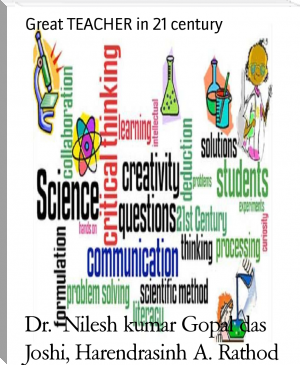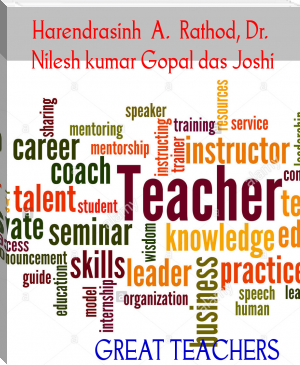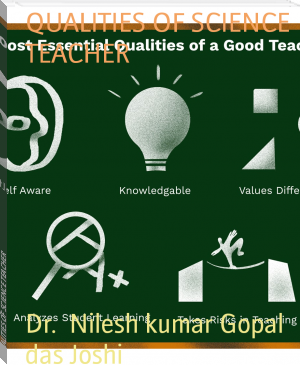Great TEACHER in 21 century by Dr. Nilesh kumar Gopal das Joshi, Harendrasinh A. Rathod (i have read the book a hundred times .txt) 📖

Book online «Great TEACHER in 21 century by Dr. Nilesh kumar Gopal das Joshi, Harendrasinh A. Rathod (i have read the book a hundred times .txt) 📖». Author Dr. Nilesh kumar Gopal das Joshi, Harendrasinh A. Rathod
Recommended:
The Best Classroom Seating arrangement for Student Learning
· Advocates for Their Profession
It’s a critical time in education and how it and teachers are being perceived. With the common core being implemented and judged, the teaching profession is being met with a close eye now more than ever before. Instead of sitting back, a 21st century takes a stand for themselves and advocates for their profession. They pay close attention to the important issues and talk about them with their community. They keep parents and students informed on what’s going on in education and address on issues head on.
21st Century learning means teaching just as you have done in the past centuries, but with way better tools. Today’s teachers have a great advantage, they have powerful learning tools at their disposal that they didn’t have before. 21st Century technology is an opportunity for students to acquire more knowledge. Teachers have the ability to move away from being the dispenser of information to someone who can guide them and prepare them for their future.
Lastly, the 21st century educator must use teaching strategies to ensure that the focus in education is on preparing today’s children for the future of where they will live and where they will work, not for our current world.
What does the 21st century teacher look like to you? Do you think they must have a set of specific skills and characteristics? Please feel free to share your thoughts with us below.
Chapter 4 Characteristics of a 21st-Century Teacher
Characteristics of a 21st-Century Teacher
What does a 21st-century teacher look like to you? You may have heard this popular buzzword thrown around your school or on the news, but do you know what a modern-day educator really looks like? Beyond the obvious of being up-to-date on the latest in technology, they can have the characteristics of a facilitator, a contributor, or even an integrator. Here are six more key characteristics of a 21st-century educator.
They're Adaptive
They are able to adapt to whatever comes there way. Being a teacher in today's world means that you have to adapt to the ever-changing tools and changes that are being implemented in the schools. Smartboards are replacing chalkboards and tablets are replacing textbooks and a 21st-century teacher needs to be okay with that.
Lifelong Learners
These educators don't just expect their students to be a lifelong learner, but they are as well. They stay up-to-date with current educational trends and technology and know how to tweak their old lesson plans from years before to make them more current.
Are Tech Savvy
Technology is changing at a rapid pace and that means that a 21st-century teacher is right along for the ride. The latest technology, whether it's for lessons or grading, will allow the teacher and student to be able to learn better and faster. An effective teacher knows that learning about the latest gadget can truly transform their students' education, so they are not just current on the new trends, but really know how to master them.
Know How to Collaborate
An effective 21st-century educator must be able to collaborate and work well within a team. Over the past decade, this important skill has grown quite rapidly in schools. Learning is deemed to be more effective when you can share your ideas and knowledge with others. Sharing your expertise and experience, and communicating and learning from others is an important part of the learning and teaching process.
Are Forward Thinking
An effective 21st-century educator thinks about their students' future and is aware of the career opportunities that may arise from them. They are always planning to ensure that no child gets left behind so they focus on preparing today's children for what's to come in the future.
Are Advocates for the Profession
They are an advocate not only for their students but their profession. Today's teachers are being watched with a close eye because of all of the changes in curriculum and the Common Core. Instead of sitting back, a 21st-century teacher takes a stand for their themselves and their profession. They pay close attention to what is going on in education and they address these issues head-on.
They also advocate for their students. Today's classrooms are filled with children who need someone to look out for them, give them advice, encouragement, and a listening ear. Effective teachers share their knowledge and expertise and act as a role model for their students.
21st-century teaching means teaching as you have always taught but with today's tools and technology. It means utilizing everything that is important in today's world so that students will be able to live and prosper in today's economy, as well as having the ability to guide students and to prepare them for the future.
Chapter 5 Top Five Characteristics of a 21st Century Educator
Top Five Characteristics of a 21st Century Educator
Last week’s blog post looked at some of the characteristics of a successful 21st century learner. But what does it mean to be an educator in a world that is continuously changing and moving at tremendously fast speeds?
Traditionally, teachers have delivered information to students much like a ‘sage on the stage’, but if children are to be truly future ready, the 21st century teacher needs to be more of a ‘guide on the side’, supporting learners in exploring and expressing their unique competencies in order to grow and flourish as individuals.
Here are the top five characteristics that today’s teachers must embrace to make the education space mutually rewarding and enjoyable for their students, themselves and other teachers alike:
Love for learning
Successful 21st Century educators don’t just expect their students to be lifelong learners, but they too stay current and on top of what’s new in education as well as other fields that interest them. They enjoy acquiring new knowledge and are enthusiastic about new experiences. They endeavour to stay current and know how to change old lesson plans to be more suitable for today.
When teachers love to learn, their enthusiasm will naturally inspire students too, contributing to a more stimulating classroom environment. Students will also feel free to share their knowledge and ideas with the teacher, which helps them build confidence and grow into independent thinkers.
Empathic
The 21st century teacher models empathy every day and gives students plenty of opportunities to demonstrate it. Why is empathy so important? Because it is a natural companion to tolerance and the ability to understand the diversity in our world makes it easier to see things from multiple perspectives. This in turn nurtures individuals who are conscious about using their knowledge and skills to help improve the human condition and make a positive contribution to the world. A good way to embrace empathy in the classroom is through integrating the use of games and websites into the lesson such as those mentioned ..
Tech-savvy
Technology is changing at a rapid pace and that means that a 21st century teacher must enjoy riding the change. The latest gadgets, applications, software and websites enable incredible transformation in the way we learn, whether it’s personalisation of lessons or gamification of the learning process. The 21st century educator understands and capitalises upon this through not only keeping abreast of the latest trends, but also experimenting with new tools and techniques that can enhance both their own and their students’ learning. However, this does not mean that technology is used just for the sake of it, even in instances where other teaching methods would be more appropriate. Effective 21st century teachers are able to integrate technology in the classroom to truly inspire and advance student learning.
Collaborative
Well-known educational author, Harry K. Wong, states that the trademark of effective schools is a culture where all teachers take responsibility for the learning of all students. The 21st century educator understands this and recognises that a student shouldn’t be the responsibility of only one teacher, but of all teachers.
Sharing expertise and experience, and communicating and learning from others is an important part of the learning and teaching process. Therefore, teachers today must value working with others and be comfortable contributing their unique ideas and perspective within a team.
Increased effective collaboration exposes teachers to improved practices, which leads to stronger pedagogy. And of course, the more effective a teacher is, the more the students will benefit and thrive.
Creative
in a world where technology can answer any question we Google, students need more opportunities to learn how to brainstorm and think creatively in order to succeed. Creativity is definitely different for different people. For some, it may be about inventing new ways to do the same things, while for others, it may involve the process of discovering new things. No matter what the concept, the 21st century educator makes it a priority to motivate children to be inventive, resourceful and expressive.
They do this through creating a classroom where the flow of invention is not disrupted by the regular class routines, textbooks and assignments. A creativity-driven classroom is characterised by enthusiastic question-answer sessions, assessment of performance and feedback, cooperation with others when it comes to sharing ideas, as well as the independence to freely express oneself.
Chapter 6 THE 7 ROLES OF A TEACHER IN THE 21ST CENTURY
THE 7 ROLES OF A TEACHER IN
 The desire to acquire knowledge about the surrounding world and human society is quite natural and understandable for a person. Life is so developed that an uneducated person will never occupy a high position in any field. Humanity in its mass, and each person individually, develops objectively, regardless of certain life circumstances and obstacles, but with different intensity. The speed of development depends on the quality of training.
The desire to acquire knowledge about the surrounding world and human society is quite natural and understandable for a person. Life is so developed that an uneducated person will never occupy a high position in any field. Humanity in its mass, and each person individually, develops objectively, regardless of certain life circumstances and obstacles, but with different intensity. The speed of development depends on the quality of training.




Comments (0)